Garden Maintenance in Coney Hall
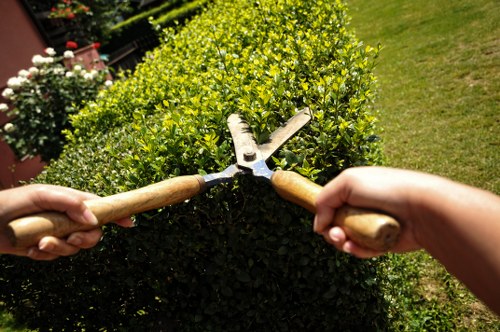
Introduction to Garden Maintenance
Maintaining a beautiful garden in
Coney Hall requires dedication, knowledge, and the right set of tools. Whether you're a seasoned gardener or a beginner, understanding the fundamentals of garden maintenance can help you create a lush, vibrant outdoor space. This article explores various aspects of garden maintenance specific to the Coney Hall area, offering tips and strategies to keep your garden thriving all year round.
Why Garden Maintenance Matters
A well-maintained garden not only enhances the aesthetic appeal of your property but also contributes to a healthier environment. Regular maintenance ensures that plants remain healthy, pests are kept at bay, and the overall ecosystem of your garden remains balanced. In Coney Hall, where the climate and soil conditions play a significant role in plant growth, tailored maintenance practices can lead to impressive results.
Understanding the Local Climate
Coney Hall experiences a temperate climate, characterized by mild winters and warm summers. This climate is conducive to a wide variety of plants, but it also presents specific challenges. Understanding the local weather patterns, soil types, and native plant species is crucial for effective garden maintenance.
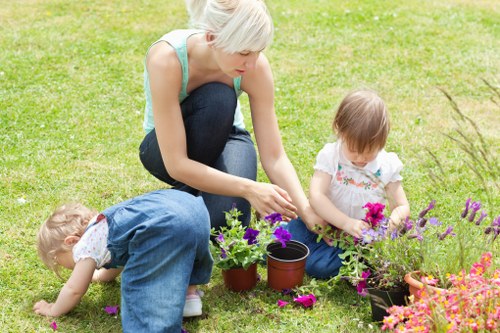
Seasonal Garden Maintenance
Spring Maintenance
Spring is the perfect time to rejuvenate your garden. Start by clearing any debris that accumulated over the winter months. Prune dead branches, apply mulch to retain moisture, and fertilize your plants to promote new growth. Planting spring-blooming flowers like tulips and daffodils can add vibrant colors to your garden.
Summer Care
During the summer, gardens require diligent watering and weeding. Implement an efficient irrigation system to ensure your plants receive adequate moisture without overwatering. Regularly remove weeds to prevent them from competing with your desirable plants for nutrients and space. Additionally, consider shading delicate plants to protect them from the intense summer sun.
Autumn Preparation
As the temperatures begin to drop, it's time to prepare your garden for the winter. Rake fallen leaves, prune overgrown branches, and plant bulbs that will bloom in the spring. Applying a layer of compost can enrich the soil, providing sustenance for plants during the colder months.
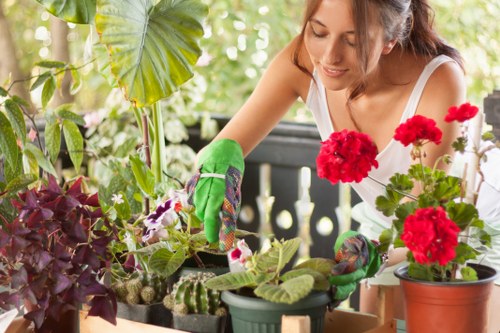
Essential Garden Maintenance Tasks
- Pruning: Regular pruning helps maintain the shape of your plants and encourages healthy growth.
- Weeding: Keeping your garden free of weeds reduces competition for resources and minimizes the risk of pests.
- Watering: Ensuring your plants receive the right amount of water is vital for their survival and growth.
- Fertilizing: Providing essential nutrients supports plant health and enhances their natural beauty.
- Soil Testing: Understanding your soil's pH and nutrient levels helps in selecting the right plants and amendments.
- Mulching conserves moisture, suppresses weeds, and improves soil structure.
- Regular pest control prevents infestations that can damage your plants.
Choosing the Right Plants
Selecting plants that are well-suited to the Coney Hall climate is fundamental for a thriving garden. Opt for native species that are adapted to the local conditions, requiring less maintenance and fewer resources. Additionally, consider the growth patterns and requirements of each plant to ensure they complement each other and the overall garden design.
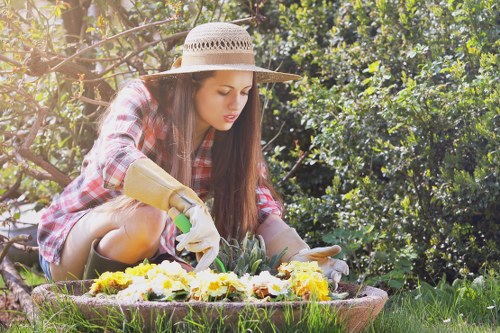
Pest and Disease Management
Identifying Common Pests
In Coney Hall, common garden pests include aphids, slugs, and caterpillars. Regularly inspecting your plants can help you catch infestations early. Look for signs like damaged leaves, discolored stems, or the presence of the pests themselves.
Natural Remedies
Whenever possible, opt for natural pest control methods to maintain an eco-friendly garden. Introducing beneficial insects like ladybugs and praying mantises can help keep pest populations in check. Additionally, using organic sprays made from neem oil or insecticidal soap can effectively eliminate unwanted pests without harming your plants.
Preventing Plant Diseases
Proper garden maintenance can significantly reduce the risk of plant diseases. Ensure adequate spacing between plants to promote air circulation, which helps prevent fungal infections. Rotate crops each season to minimize soil-borne diseases and practice good hygiene by removing and disposing of infected plant material.
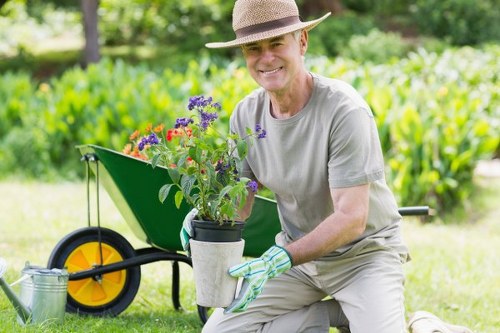
Tools and Equipment for Garden Maintenance
Essential Tools
Equipping yourself with the right tools makes garden maintenance easier and more efficient. Some essential tools include:
- Pruning shears
- Hand trowel
- Garden fork
- Spade
- Watering can or hose
Advanced Equipment
For larger gardens or more intensive maintenance, consider investing in advanced equipment such as lawn mowers, hedge trimmers, and rototillers. These tools can save time and effort, allowing you to focus on other aspects of garden care.
Maintenance Schedules
Creating a maintenance schedule helps ensure that all tasks are performed in a timely manner. Divide your schedule into daily, weekly, and monthly tasks to keep your garden in optimal condition. Regular maintenance not only keeps your garden looking beautiful but also promotes the health and longevity of your plants.
Daily Tasks:
- Check for any signs of pests or diseases
- Water plants as needed
Weekly Tasks:
- Weed the garden beds
- Prune overgrown plants
Monthly Tasks:
- Fertilize plants
- Inspect and maintain garden tools

Landscaping Tips for Coney Hall Gardens
Designing Your Garden Layout
A well-designed garden layout enhances both the functionality and beauty of your outdoor space. Consider the natural flow of your garden, the placement of different plant species, and the integration of hardscaping elements like walkways and seating areas. Utilizing layers and varying plant heights can add depth and interest to your garden design.
Choosing Color Schemes
Selecting a cohesive color scheme can tie your garden together. Opt for complementary colors or varying shades of the same color to create a harmonious look. Seasonal color planning ensures that your garden remains visually appealing throughout the year.
Incorporating Hardscaping Elements
Hardscaping elements such as pathways, patios, and garden structures add functionality and aesthetic appeal to your garden. Choose materials that complement your garden's style and are durable enough to withstand the local climate. Properly integrated hardscaping can also help define different areas within your garden, making maintenance more manageable.

Sustainable Garden Practices
Water Conservation
Implementing water-efficient practices is crucial for sustainable garden maintenance. Consider installing drip irrigation systems that deliver water directly to the plant roots, minimizing evaporation and runoff. Collecting rainwater in barrels can also provide an eco-friendly water source for your garden.
Soil Health
Maintaining healthy soil is the foundation of a thriving garden. Regularly adding organic matter like compost enriches the soil, improves its structure, and supports beneficial microorganisms. Avoid over-tilling, which can disrupt soil ecology and lead to erosion.
Composting
Composting is an excellent way to recycle garden waste and create nutrient-rich fertilizer for your plants. Establish a composting system to break down organic materials like leaves, grass clippings, and kitchen scraps. Properly managed compost contributes to soil fertility and reduces the need for chemical fertilizers.
Eco-Friendly Pest Control
Adopting eco-friendly pest control methods helps preserve the natural balance of your garden. Encourage biodiversity by planting a variety of species that attract beneficial insects. Use physical barriers like nets and traps to protect plants from pests without relying on harmful chemicals.
Reducing Carbon Footprint
Sustainable garden practices not only benefit your garden but also contribute to a healthier environment. Reducing your garden's carbon footprint involves minimizing the use of fossil fuel-powered tools, opting for renewable energy sources, and choosing locally sourced materials. These efforts support environmental conservation and promote long-term sustainability.

Professional Garden Maintenance Services
Benefits of Hiring Professionals
While many gardeners enjoy maintaining their gardens themselves, hiring professional garden maintenance services in Coney Hall offers several advantages. Professionals bring expertise, experience, and efficient techniques that can enhance the overall health and appearance of your garden.
Services Offered
Professional garden maintenance services typically include:
- Regular mowing and trimming
- Pruning and shaping plants
- Weed control and management
- Planting and bed maintenance
- Soil testing and fertilization
Choosing the Right Service Provider
When selecting a garden maintenance service in Coney Hall, consider factors such as experience, reputation, and the range of services offered. Look for providers who understand the local climate and plant species, ensuring that your garden receives the best possible care.
Customized Maintenance Plans
A reputable garden maintenance service will offer customized plans tailored to your garden's specific needs. This ensures that all aspects of your garden are addressed, from seasonal tasks to routine upkeep. A personalized approach leads to more efficient maintenance and a healthier garden.
Cost Considerations
While professional services come with a cost, the benefits often outweigh the expense. Consider the value of your time, the expertise provided, and the long-term health of your garden when evaluating service costs. Investing in professional maintenance can lead to a more beautiful and sustainable garden.

DIY Garden Maintenance Tips
Planning and Organization
Effective garden maintenance starts with good planning. Outline your maintenance schedule, keeping track of tasks and seasonal requirements. Organize your tools and materials to ensure that everything you need is readily available when it's time to work.
Efficient Watering Techniques
Watering your garden efficiently is key to plant health and water conservation. Water early in the morning or late in the evening to reduce evaporation. Use soaker hoses or drip irrigation systems to deliver water directly to the soil, ensuring that plants receive the moisture they need without waste.
Soil Preparation
Healthy soil leads to healthy plants. Regularly amend your soil with compost or well-rotted manure to improve its fertility and structure. Conduct soil tests to determine nutrient deficiencies and adjust your soil accordingly. Proper soil preparation sets the foundation for successful gardening.
Regular Inspection
Consistently inspecting your plants helps you identify issues before they become serious problems. Look for signs of pests, diseases, or nutrient deficiencies. Addressing these issues promptly can prevent widespread damage and keep your garden flourishing.
Pruning and Trimming
Regular pruning and trimming encourage healthy growth and maintain the desired shape of your plants. Remove dead or diseased branches, and thin out overcrowded areas to promote better air circulation and sunlight penetration. Proper pruning techniques enhance the beauty and longevity of your plants.

Enhancing Garden Aesthetics
Choosing the Right Plants
Selecting a diverse range of plants can add texture, color, and interest to your garden. Combine flowering plants with foliage plants, and vary plant heights to create a layered effect. Incorporate evergreens to provide year-round structure and variety.
Garden Decor
Adding decorative elements such as garden statues, benches, and lighting can enhance the visual appeal of your garden. Choose decor that complements your garden's style and theme, creating a cohesive and inviting outdoor space.
Companion Planting
Companion planting involves growing compatible plants close together to promote mutual benefits. Some plants can deter pests, improve soil health, or provide shade for more delicate species. Research compatible plant pairings to optimize the health and productivity of your garden.
Pathways and Borders
Creating defined pathways and borders helps organize your garden and makes maintenance easier. Use materials like gravel, stone, or wood to create durable and attractive pathways. Borders can contain plants, preventing them from spreading uncontrollably and maintaining a neat appearance.
Water Features
Incorporating water features such as fountains, ponds, or birdbaths can add a soothing element to your garden. These features attract wildlife, create focal points, and enhance the overall ambiance of your outdoor space.

Environmental Considerations
Promoting Biodiversity
Encouraging biodiversity in your garden supports a healthy ecosystem. Plant a variety of species to provide habitats for different insects, birds, and other wildlife. Diverse plant life enhances resilience against pests and diseases, contributing to a balanced and thriving garden.
Reducing Chemical Use
Minimizing the use of chemical fertilizers and pesticides is beneficial for both your garden and the environment. Opt for organic alternatives and natural pest control methods to maintain a safe and sustainable garden. Reducing chemical use also promotes the health of beneficial insects and other wildlife.
Climate Resilience
Building climate resilience in your garden involves selecting plants that can withstand local weather conditions and implementing practices that mitigate the effects of extreme weather. Mulching, proper watering, and choosing hardy plant varieties contribute to a resilient garden that can thrive despite changing climate patterns.
Energy Efficiency
Implementing energy-efficient practices in your garden maintenance can reduce your carbon footprint. Use manual or low-energy tools, maximize natural light through strategic plant placement, and incorporate renewable energy sources like solar-powered lights.
Wildlife-Friendly Gardening
Creating a wildlife-friendly garden supports local fauna and enhances the natural beauty of your garden. Provide food sources, shelter, and water for birds, bees, and other beneficial organisms. Planting native species attracts wildlife and promotes ecological balance.

Common Challenges in Garden Maintenance
Pest Infestations
Pests can wreak havoc on your garden if not managed properly. Common pests in Coney Hall include aphids, slugs, and mites. Identifying the type of pest is the first step in effective management. Implementing preventive measures and using targeted treatments can help control pest populations.
Weed Overgrowth
Weeds compete with your plants for nutrients, water, and light, hindering their growth. Regular weeding is essential to maintain a healthy garden. Applying mulch can suppress weed growth, reducing the need for constant maintenance.
Diseases and Fungal Infections
Plant diseases can spread quickly, causing significant damage if not addressed promptly. Common diseases include powdery mildew, rust, and blight. Practicing good garden hygiene, such as removing infected plant material and ensuring proper air circulation, can help prevent the spread of diseases.
Soil Degradation
Poor soil quality can limit plant growth and lead to nutrient deficiencies. Regularly amending your soil with organic matter like compost improves its fertility and structure. Conducting soil tests helps you understand and address specific soil issues.
Weather Extremes
Extreme weather conditions, such as heavy rains, droughts, or frost, can impact your garden. Implementing protective measures like rainwater harvesting, drought-resistant plants, and frost covers can help mitigate the effects of adverse weather.

Innovative Garden Maintenance Techniques
Vertical Gardening
Vertical gardening is an innovative approach that maximizes space and adds visual interest to your garden. Utilize trellises, wall-mounted planters, and vertical structures to grow climbing plants and herbs. This technique is especially beneficial for small gardens or urban spaces.
Smart Gardening
Incorporating technology into your garden maintenance can enhance efficiency and effectiveness. Smart irrigation systems, weather sensors, and garden management apps help you monitor and manage your garden with ease. These tools provide real-time data, enabling you to make informed decisions about watering, fertilizing, and pest control.
Hydroponics and Aquaponics
Hydroponics and aquaponics are modern gardening techniques that allow you to grow plants without traditional soil. Hydroponics uses nutrient-rich water solutions, while aquaponics combines hydroponics with aquaculture, creating a symbiotic system where fish waste provides nutrients for the plants. These methods can increase yields and reduce water usage.
Compost Tea
Compost tea is a liquid fertilizer made by steeping compost in water. It is rich in beneficial microorganisms and nutrients that promote plant health. Applying compost tea to your garden can enhance soil fertility, improve plant growth, and increase resistance to pests and diseases.
Mulching Innovations
Modern mulching techniques involve using a variety of materials to conserve moisture, suppress weeds, and improve soil health. Organic mulches like wood chips, straw, and leaves decompose over time, enriching the soil. Inorganic mulches, such as gravel and rubber, provide long-lasting weed control and moisture retention.

Conclusion: Achieving a Beautiful Garden in Coney Hall
Commitment to Regular Maintenance
Maintaining a beautiful garden in Coney Hall requires consistent effort and attention. By following the tips and strategies outlined in this article, you can ensure that your garden remains healthy, vibrant, and visually appealing throughout the year.
Embracing Sustainable Practices
Incorporating sustainable gardening practices not only benefits your garden but also contributes to a healthier environment. Sustainable maintenance techniques promote biodiversity, conserve resources, and reduce your garden's ecological footprint.
Enjoying the Fruits of Your Labor
A well-maintained garden offers numerous rewards, from a peaceful retreat to increased property value. Take the time to enjoy the beauty and tranquility of your outdoor space, knowing that your efforts have created a thriving garden that enhances your quality of life.
Get Started Today!
Whether you're embarking on a new gardening journey or seeking to improve your existing garden, now is the perfect time to start.
Contact us today to learn more about professional garden maintenance services in Coney Hall or
book your service now to transform your outdoor space into a stunning paradise.















